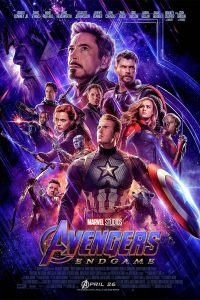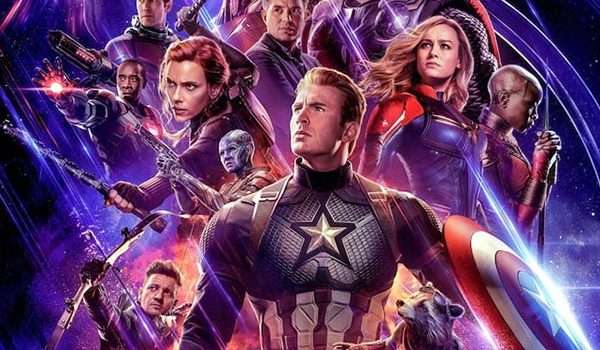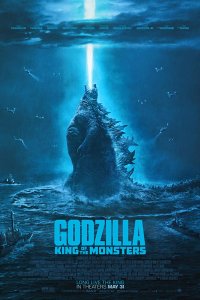Necromancing the Stones: Arley Sorg and Josh Pearce Discuss Avengers: Endgame
 Previously, on the Avengers: Thanos (Josh Brolin) used the Infinity Gauntlet to murder half of all living creatures in the universe. Surviving superheroes Thor (Chris Hemsworth), Iron Man (Robert Downey, Jr.), Captain America (Chris Evans), Black Widow (Scarlett Johansson), Rocket (voiced by Bradley Cooper), Hulk (Mark Ruffalo), War Machine (Don Cheadle), Hawkeye (Jeremy Renner), Ant-Man (Paul Rudd), and sometimes Captain Marvel (Brie Larson) band together to get the Infinity Stones and undo everything that Thanos has done.
Previously, on the Avengers: Thanos (Josh Brolin) used the Infinity Gauntlet to murder half of all living creatures in the universe. Surviving superheroes Thor (Chris Hemsworth), Iron Man (Robert Downey, Jr.), Captain America (Chris Evans), Black Widow (Scarlett Johansson), Rocket (voiced by Bradley Cooper), Hulk (Mark Ruffalo), War Machine (Don Cheadle), Hawkeye (Jeremy Renner), Ant-Man (Paul Rudd), and sometimes Captain Marvel (Brie Larson) band together to get the Infinity Stones and undo everything that Thanos has done.
Arley: I loved the fucked-up opening.
Josh: With Hawkeye? I agree. I thought that was the strongest part of the movie, although his character turns into some kinda silly ninja later on.
Arley: That didn’t bother me – I kinda liked it; it’s true to his comic book self. I also like the opening with Tony Stark and Nebula (Karen Gillan) on the ship. They have a good rapport, and when she puts him in the pilot seat and touches his arm, that’s a really great, brief moment, especially if you remember Nebula’s story. Stark looked great for that scene. I think he lost weight to look that gaunt and desiccated.
Josh: I think Nebula is a boring character and I don’t like her actor.
Arley: Okay, fine, but overall the acting was better, a little more restrained than the other movies. Some characters stood out to me — Stark, obviously — but the standout performance was Pepper Potts (Gwyneth Paltrow). She had subtly delivered, emotionally resonant moments that could have been overwrought, but she delivered them beautifully. What she did with her role, achieved in very limited time, really hit me. In contrast, Captain America was flat, to the point of why even bother delivering lines? You’re just there to give stern looks.
Josh: Yeah there was a moment, I think it was in the support group, but Chris Evans brought out the Brooklyn accent really heavy and was laying it on really thick about “just gotta keep living,” humans/Americans are exceptional because of their perseverance or whatever. It was cliché and heavy-handed, and I wasn’t buying into it at all. There are a number of genuinely tender moments in this movie (I saw several people crying in the theater), and that wasn’t one of them.
Despite the name, Endgame is not a movie about the good guys deploying masterful, chess-like strategy to defeat an all-powerful opponent. Instead, they revert to what they do best — punching their problems right in the face. The movie contains a lot of flash, some trademark Marvel humor, and, arguably, a wider range of emotional scenes than in previous MCU films, but not even that nor the balls-out final battle scene can live up to the hype and expectations set by an 11-year buildup.
Arley: I really liked the movie, though!
Josh: I didn’t like it.
Arley: Wait, really?
Josh: At some point I thought, “This movie is a trash fire,” and then by the time Black Widow and Hawkeye were climbing the mountain, I was thinking, “I’m bored.” I checked my watch multiple times to see how much longer the movie had. What dragged it down for me was how bland and unappealing the surviving characters were. I understand this is meant to wrap up phase whatever and set the stage for the next generation of Avengers, but these are the characters I’m least interested in watching: I think Captain America is the most boring avenger; the first two Thor movies were terrible, and his role in Endgame included none of the charm and very little of the humor that made Ragnarok my favorite MCU movie; I’ve seen enough Hulk standalone films to know I don’t want to watch another one; Hawkeye and Black Widow might have interesting stories on their own terms, but are always overshadowed by the big muscular men; Rocket isn’t as much fun without the rest of the Guardians; Ant-Man is so white bread; and Captain Marvel isn’t really in the movie. She’s not dead, she’s just not there. I still like Iron Man, but that’s one guy in a sea of lackluster.
Arley: I left the movie with that feeling of enjoyment and “this is great.” I mean, it’s a comic book movie. The more I thought and talked about it, the more I frown and have problems with it. (But I still liked it overall.) Problem: this is a white-ass movie. The core cast (the survivors from the last movie) is mainly white and male, the focus is on them, and reverts back to straight white male geekdom fantasy fulfillment. Can we talk about Don Cheadle for a moment? Of these core Avengers, he is the single most capable actor and is heavily underused. He can act circles around anyone else in the cast, but in every movie, he’s diminished to the role of Iron Man’s best friend. And War Machine is awesome. He’s basically Iron Man with more guns, and with all the hierarchy, legislation, and structure that Iron Man’s been complaining about ever since Civil War. Okoye (Danai Gurira) survived Thanos in Infinity War but she plays no role in recovering the Infinity Stones. Valkyrie (Tessa Thompson) is another woman of color who theoretically could have been involved in everything, but wasn’t.
Josh: I guess we should declare Spoilers Ahead before we talk about how they actually go about it.
Arley: Okay.
Josh: Ready?
Arley: Yeah.
Josh: Okay. Time travel.
After being trapped in the quantum realm for five subjective hours at the end of Ant-Man and the Wasp, Scott Lang returns to find that five years have passed for everyone else, indicating that the Avengers can use the quantum realm to travel back in time and gather the six stones before Thanos finds them, and use their power to restore the disappeared. In the movie’s model of spacetime, it is impossible to change the past (because any effect branches off into a new timeline) but objects can be brought forward into their present. (See movie for full infodump.)
Josh: I actually liked the mini-sequence of Ant-Man coming back to a depopulated Bay Area and having no idea what was happening, and no one would tell him. A solid depiction of future shock, a good place for the audience to have a visceral reaction to Thanos’s destruction. I was expecting Michael Peña to randomly show up, but he didn’t. Missed chance for some great scene-stealing acting right there.
Arley: I was disappointed that they used time travel at all because it was a cheap plot device, and the fact that they kill earlier Thanos at the end means that he doesn’t get the Infinity Stones (because he’s a younger Thanos). Once time travel is introduced in a story, nothing matters, because anything can be undone.
Josh: Don Cheadle gave a shout-out to Time After Time, one of the better time travel movies that nobody has ever seen. There was a chance for Endgame to set up an interesting logic puzzle, or some clever solution, using scenarios from all the other Marvel movies, giving the dead characters a chance to participate. There were split-second flashes of that, like hinting at the possibility, but it didn’t manifest.
Arley: One of the background characters (Ken Jeong) was reading a J.G. Ballard book (Terminal Beach), which was a deliberate director’s choice to connect with science fiction viewers, but Endgame is another movie where “quantum magic” is the main plot point. Worse, the coincidences were starting to stack up – Hulk seeing himself, Thor seeing his mom, Stark seeing his dad, Captain America fighting himself, and running into Agent Carter. One coincidence might have been a good scene, but that many times? That was authorial manipulation. Be that as it may, CGI Michael Douglas looked amazing.
Other than brief lip service paid to scientific plausibility for the time travel, the rules of the movie are not well-established, or are presented in such a flurry of jargon and jokes as to be essentially meaningless, or are flat-out broken. If they are established in prior movies, it’s a lot of ground to remember. Not only rules for the functioning of plot devices, but also rules for character abilities. Dedicated comic book readers will know, for instance, the comparative lifting power of the Hulk versus Thor versus Captain Marvel, but that is knowledge that has been earned through years of reading and discussion, a heavy investment of time and money. These fans are undoubtedly rewarded with in-jokes, Easter Eggs, and much-anticipated character crossovers. Comic book readers make up a fraction of the audience for a movie with a billion dollar worldwide opening weekend. One can’t make a movie with this broad an audience and not give them the rules beforehand. That’s bad writing. This is not a comic book, it’s a movie, and it should work as a piece of cinema first, with consistent rules, no matter how fantastic they may be. There’s no amount of writing that can cover all the plotholes of time travel and the Infinity Gauntlet at the same time.
Arley: I mean, it didn’t bother me as much, but I am a comic book person, so I already expect magic to coexist with science, aliens, and gods.
Josh: When everyone’s discussing things, Ant-Man constantly says, “I have no idea what you’re talking about,” and I was like, “I feel you.” The filmmakers also went to great lengths to keep Hulk from fighting Thanos again. Especially from fighting Thanos when he doesn’t have any Infinity Stones.
Arley: It was cool to see Hulk as Smart Hulk. That’s something comic book fans will appreciate. But it broke my suspension of disbelief when Thanos bombarded the Avengers house and none of the human characters were even limping afterward. I call bullshit on that. And at the end of the movie, it didn’t have to be Iron Man who wielded the gauntlet. He could have given it to Thor, or Dr. Strange — they’re strong enough. Or even Spider-man, whose suit is made of the same nanos as Iron Man’s. As for the “time heist” — if you were a smart leader, you wouldn’t send Captain America to deal with Captain America, you’d send Thor. Someone who will fuck him up. A mismatch.
Josh: Someone they won’t recognize.
Arley: Something else that was fucked up about this movie (pointed out to me by my friend Carrie Hanson) — Captain America, whose entire theme is “sacrifice for the common good,” goes back in time to be with Agent Carter, which obliterates her timeline. In her show, she has kids, a husband, and a career, but Captain America takes what he wants. What a good guy. How romantic. It’s worse than Thanos.
Josh: It very well could be, considering all the potential people he wiped out by doing that.
Despite these weaknesses, audiences were still entertained, cheering when all of the formerly disappeared Avengers returned, and applauding at the end of the movie. (We’ll save you some time — there are no after-credit scenes.) The final battle is a Ready Player One-style avalanche of overwhelming visuals, which eventually boils down to, basically, a football game. Every major superhero from the past 21 films, plus some new ones, joins the fight.
Josh: Typical Marvel movie problem of everyone doing melee attacks. I’d like to see a single Marvel villain show up with knowledge of 18th-century battle tactics and just tear apart their charge with a Napoleonic square or even a Roman phalanx. Also, now what, Gwyneth Paltrow is a superhero? When the fuck did that happen? I realized later that they’d kind of hinted at it earlier in the movie but there was so much going on that it had been completely erased from my memory so it took me forever to figure out who was in the blue suit. It’s hard for me to picture Pepper Potts in any kind of action role, but maybe nano-goop can give anyone superpowers.
Arley: It should have been Black Panther in this movie instead of Hawkeye, and maybe foreground Captain Marvel? These are wildly popular characters who proved their worth through sales and public response. The directors and writers could have done better with women’s roles. In the entire movie, women (and people of color) don’t make decisions or actions that affect the plot, except for Nebula. They kill off Black Widow, who is the only woman in the core cast.
Josh: That scene was set up so that Black Widow had to be the one to die because Hawkeye has a family, which makes him “more important” than the single female. (That’s logic!) Also, for all her hype, power, and introduction, Captain Marvel does little to nothing. And strangely, Thanos doesn’t seem to know who she is. Shouldn’t he? Since they’re both within one degree of Ronan?
Arley: When she does appear, it has a triumphant feeling. She’s basically Superman in this universe. She’s the cavalry. I wonder if they couldn’t use her because they’d made her so OP, so they messed that up. But yeah – underutilized. And when she came in the crowd applauded. There was a good scene in the boss fight where all of the women are shown together, poster-style, and rush to attack at once. I loved that!
Josh: It’s a good shot, but it makes the rest of the movie look bad by contrast. I remember it being so noticeable because there are hardly any women earlier on. In the end, all the white men pass on their roles to women and/or people of color. Thor gives the throne of Asgard to Valkyrie. Captain America passes his shield to Falcon (Anthony Mackie). Pepper Potts becomes Iron Maiden.
Though this is the closing chapter in a long saga, and several characters are still dead, things are left open-ended enough for infinite continuation, including the possibility of bringing back favorites such as Loki (Tom Hiddleston) and Gamorra (Zoe Saldana).
Arley: When Peter Parker went back to his high school and saw his friend — that guy’s emotional reaction, what he expressed in a fraction of a second, made me teary.
Josh: What I was wondering was, did that kid disappear also? Or had he been waiting five years for Peter to come back? Is he now five years older than Spider-man? There was like three hours of crying in this movie, both from the audience and from the cast. Hawkeye, Thor, Stark, Captain America, Ant-Man — they all spent a lot of time crying.
Arley: There’s a writing theory where if your character cries too much or too early, it loses power because there’s not much else to escalate to, emotionally.
Josh: Even with all the depressing stuff, the comedy was still up from Captain Marvel. But down from Infinity War, probably because they got rid of all their comedic relief characters like Drax (Dave Bautista) and Peter Quill (Chris Pratt). Overall, I found it a disappointing conclusion.
Arley: It was fun! The battle scene was way better than in the last movie, there were moments of real, raw emotion in the acting, and some cool action sequences worth seeing in theaters.
Thus concludes the 22-film “Infinity Saga” — which began with 2008’s Iron Man — an undeniably impressive undertaking by Marvel, which has maintained a stable of beloved characters for over a decade, largely satisfying the expectations of comic book aficionados while also cultivating deep loyalties amongst new fans. Disney’s recent purchase of 21st Century Fox now gives them the chance to integrate even more characters such as the X-Men and Deadpool into the MCU, just in time for the next saga.
Where do we go from here?
Give Valkyrie her own movie.
Directed by: Anthony Russo & Joe Russo
Written by: Christopher Markus & Stephen McFeely
Based on the comics by: Stan Lee, Jack Kirby & Jim Starlin
Starring: Robert Downey, Jr., Chris Evans, Mark Ruffalo, Chris Hemsworth, Scarlett Johansson, Jeremy Renner, Don Cheadle, Paul Rudd, Benedict Cumberbatch, Chadwick Boseman, Brie Larson, Tom Holland, Karen Gillan, Zoe Saldana, Evangeline Lilly, Tessa Thompson, Rene Russo, Elizabeth Olsen, Anthony Mackie, Sebastian Stan, Tom Hiddleston, Danai Gurira, Benedict Wong, Pom Klementieff, Dave Bautista, Letitia Wright, John Slattery, Tilda Swinton, Jon Favreau, Hayley Atwell, Natalie Portman, Marisa Tomei, Taika Waititi, Angela Bassett, Michael Douglas, Michelle Pfeiffer, William Hurt, Cobie Smulders, Sean Gunn, Winston Duke, Linda Cardellini, Maximiliano Hernández, Frank Grillo, Hiroyuki Sanada, Tom Vaughan-Lawlor, James D’Arcy, Jacob Batalon, Vin Diesel, Bradley Cooper, Gwyneth Paltrow, Robert Redford, Josh Brolin, Chris Pratt, Samuel L. Jackson & Lexi Rabe

JOSH PEARCE, Assistant Editor, started working at Locus in 2016. He studied creative writing at SFSU and has sold short stories and poems to a variety of speculative fiction magazines. Born and raised in the Bay Area, he currently lives in the East Bay with his wife and son and spends way too much time on Twitter: @fictionaljosh. One time, Ken Jennings signed his chest.
ARLEY SORG, Associate Editor, grew up in England, Hawaii, and Colorado. He studied Asian Religions at Pitzer College. He lives in Oakland, and usually writes in local coffee shops. A 2014 Odyssey Writing Workshop graduate, he is soldering together a novel, has thrown a few short stories into orbit, and hopes to launch more.
 While you are here, please take a moment to support Locus with a one-time or recurring donation. We rely on reader donations to keep the magazine and site going, and would like to keep the site paywall free, but WE NEED YOUR FINANCIAL SUPPORT to continue quality coverage of the science fiction and fantasy field.
While you are here, please take a moment to support Locus with a one-time or recurring donation. We rely on reader donations to keep the magazine and site going, and would like to keep the site paywall free, but WE NEED YOUR FINANCIAL SUPPORT to continue quality coverage of the science fiction and fantasy field.
©Locus Magazine. Copyrighted material may not be republished without permission of LSFF.









The writers have said that when Captain America stays with Peggy Parker, he creates a new timeline in which they’re married — and much else changes.
Then at the end of the movie, he travels cross-dimensionally to the “original” timeline, with -his- timeline’s CA shield.
Likewise, when Loki escapes (with the Tesseract!) he creates another timeline; that’s how Loki is going to return, as a cross-dimensional alternative, old-style, rule-the-world -bad- Loki.